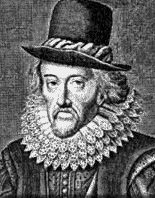Essays of Francis Bacon
The Essays or Counsels, Civil and Moral, of Francis Ld. Verulam Viscount St. Albans

Francis Bacon (1561-1626)
Of Fortune
IT CANNOT be denied, but outward accidents conduce much to fortune; favor, opportunity, death of others, occasion fitting virtue. But chiefly, the mould of a man’s fortune is in his own hands. Faber quisque fortunae suae, saith the poet. And the most frequent of external causes is, that the folly of one man, is the fortune of another. For no man prospers so suddenly, as by others’ errors. Serpens nisi serpentem comederit non fit draco. Overt and apparent virtues, bring forth praise; but there be secret and hidden virtues, that bring forth fortune; certain deliveries of a man’s self, which have no name. The Spanish name, desemboltura, partly expresseth them; when there be not stonds nor restiveness in a man’s nature; but that the wheels of his mind, keep way with the wheels of his fortune. For so Livy (after he had described Cato Major in these words, In illo viro tantum robur corporis et animi fuit, ut quocunque loco natus esset, fortunam sibi facturus videretur) falleth upon that, that he had versatile ingenium. Therefore if a man look sharply and attentively, he shall see Fortune: for though she be blind, yet she is not invisible. The way of fortune, is like the Milken Way in the sky; which is a meeting or knot of a number of small stars; not seen asunder, but giving light together. So are there a number of little, and scarce discerned virtues, or rather faculties and customs, that make men fortunate. The Italians note some of them, such as a man would little think. When they speak of one that cannot do amiss, they will throw in, into his other conditions, that he hath Poco di matto. And certainly there be not two more fortunate properties, than to have a little of the fool, and not too much of the honest. Therefore extreme lovers of their country or masters, were never fortunate, neither can they be. For when a man placeth his thoughts without himself, he goeth not his own way. An hasty fortune maketh an enterpriser and remover (the French hath it better, entreprenant, or remuant); but the exercised fortune maketh the able man. Fortune is to be honored and respected, and it be but for her daughters, Confidence and Reputation. For those two, Felicity breedeth; the first within a man’s self, the latter in others towards him. All wise men, to decline the envy of their own virtues, use to ascribe them to Providence and Fortune; for so they may the better assume them: and, besides, it is greatness in a man, to be the care of the higher powers. So Caesar said to the pilot in the tempest, Caesarem portas, et fortunam ejus. So Sylla chose the name of Felix, and not of Magnus. And it hath been noted, that those who ascribe openly too much to their own wisdom and policy, end infortunate. It is written that Timotheus the Athenian, after he had, in the account he gave to the state of his government, often interlaced this speech, and in this, Fortune had no part, never prospered in anything, he undertook afterwards. Certainly there be, whose fortunes are like Homer’s verses, that have a slide and easiness more than the verses of other poets; as Plutarch saith of Timoleon’s fortune, in respect of that of Agesilaus or Epaminondas. And that this shoulld be, no doubt it is much, in a man’s self.
 Continue...
Continue...